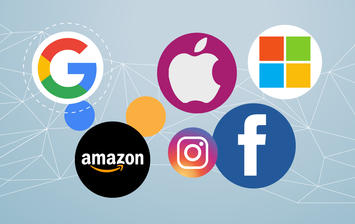
The Department of Homeland Security revealed last week that it was creating a Disinformation Governance Board to distribute "best practices" for countering disinformation. The new board joins a growing chorus—which includes President Biden and former President Barack Obama—that views disinformation disseminated on social media as one of the biggest threats facing our democracy.
But there's a much bigger threat to democracy coming out of Silicon Valley and it's this: America's largest financial and tech companies increasingly act as independent countries, routinely exporting jobs, money and technology to our most significant global adversary. These companies, their assets, and increasingly their workers, exist wholly outside of America's democratic borders and under the auspices of China's anti-democratic ones. And they are bringing these undemocratic pressures back home with them, subverting our democracy from within.
Apple Computers, once the ultimate expression of American entrepreneurial innovation, epitomizes this new corporate mindset. With ever-increasing dependence on Beijing, the company is much more in line with Xi Jinping's promised "China dream" of greater wealth and technological supremacy than it is with the American Dream. The company may be based in Cupertino, but it produces two-fifths of its products in China, four times more than the share made in the U.S., and despite rising concerns about China's ascendancy, Apple is doubling down on its support for the emerging authoritarian world-state.
In 2016, Apple negotiated a $275 billion deal with China that guarantees the firm's continued dependence on the Middle Kingdom, with additional promises to share vital technology with our most important global adversary. The company recently announced plans to source some of its chips in China, and Apple also contributes to and profits from China's ever-expanding surveillance system.
But the growing divergence between Apple's interests and America's is not unique. As economic power consolidates here, some companies, notably Wall Street and the tech giants, have grown so large and powerful that they have become in essence their own nation states.
By 2020, the five largest tech companies had total revenue amounting to half of those of all state governments combined. In January this year, Apple's market cap was larger than the GDPs of all but seven countries. But this is not exceptional. Microsoft's market cap is larger than that of Canada, Brazil, Russia, Korea, or Mexico. Amazon does about the same.
But these companies don't employ masses of Americans to make their money; production is generally shifted elsewhere. Those non-elite jobs which do exist are often dangerous, short-term and driven by relentless monitoring. And even when it comes to tech workers, Big Tech goes elsewhere for (cheap) talent: Some 75 percent of Silicon Valley's workforce are not U.S. citizens. Many have H-IB visas, which make their holders essentially indentured servants, brought into the U.S. on short-term contracts to do work for tech companies that evade the burden of paying wages as high as they would to American workers.
Read the rest of this piece at Newsweek.
Joel Kotkin is the author of The Coming of Neo-Feudalism: A Warning to the Global Middle Class. He is the Roger Hobbs Presidential Fellow in Urban Futures at Chapman University and Executive Director for Urban Reform Institute. Learn more at joelkotkin.com and follow him on Twitter @joelkotkin.












